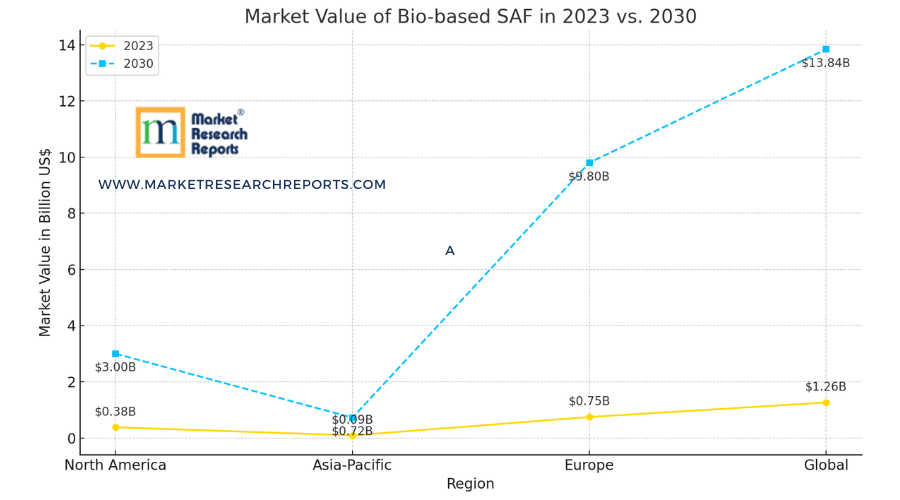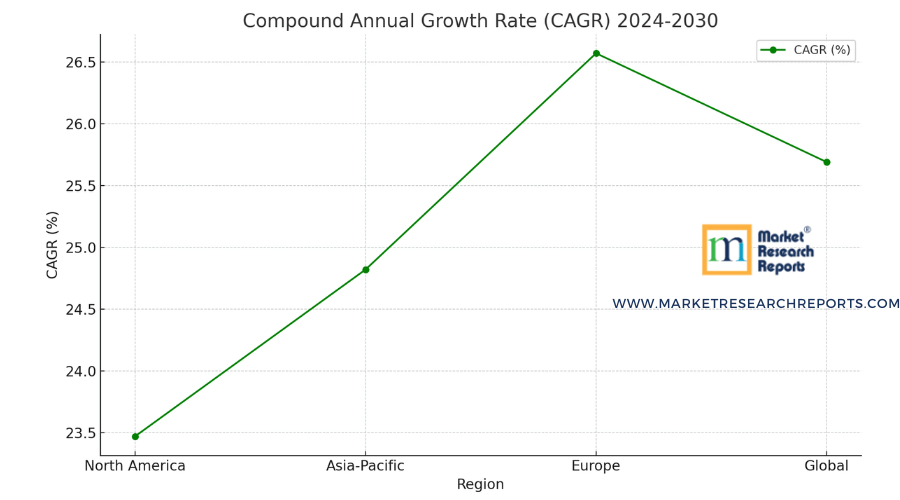Global Bio-based Aviation Fuel Market Soars: Projections Reach $13.8 Billion by 2030

The aviation industry, a vital contributor to global transportation, faces mounting pressure to reduce its environmental footprint. As concerns over climate change intensify, the demand for sustainable alternatives to traditional jet fuels has escalated. Bio-based Sustainable Aviation Fuel (SAF) emerges as a promising solution, offering a path toward decarbonization without compromising flight safety or performance. This article explores the latest developments in SAF technology and its potential to revolutionize air travel.
1 . Understanding Bio-based SAF:
Bio-based SAF is derived from renewable resources such as agricultural residues, algae, and waste oils. Unlike conventional jet fuel, which primarily consists of fossil hydrocarbons, SAF significantly reduces greenhouse gas emissions throughout its lifecycle. By harnessing organic materials, SAF mitigates reliance on finite fossil fuel reserves while curbing emissions of carbon dioxide (CO2), nitrogen oxides (NOx), and particulate matter.
Recent advancements in biofuel production processes have bolstered the feasibility and scalability of SAF. Innovative techniques such as hydroprocessing and Fischer-Tropsch synthesis enable the conversion of biomass into high-quality aviation fuel that meets stringent industry standards. Moreover, ongoing research focuses on enhancing the efficiency of feedstock cultivation, refining methods, and distribution networks to streamline SAF production and deployment.
The adoption of bio-based SAF offers a multitude of environmental benefits, including reduced carbon footprint, improved air quality, and enhanced sustainability. By substituting fossil fuels with renewable alternatives, airlines can achieve significant reductions in net CO2 emissions, contributing to global efforts to combat climate change. Additionally, the use of SAF mitigates the adverse environmental impact associated with conventional aviation, thereby preserving ecosystems and biodiversity.
The widespread adoption of SAF hinges upon collaborative efforts among stakeholders across the aviation sector, including airlines, manufacturers, regulators, and research institutions. Initiatives such as the International Air Transport Association's (IATA) Sustainable Aviation Fuel Roadmap outline comprehensive strategies to accelerate the production and uptake of SAF. Furthermore, regulatory frameworks and incentives play a pivotal role in incentivizing investment in biofuel infrastructure and fostering market competitiveness.
2 . Bio-based SAF Market Scenario and Projections
Global Bio-based Sustainable Aviation Fuel (SAF) market, with projections indicating a substantial increase in market size by 2030. Here's a descriptive analysis on the data:
Market Growth Trajectory:
- The global market for Bio-based Sustainable Aviation Fuel (SAF) experienced rapid growth, increasing from US$ 1,262.0 million in 2023 to an estimated US$ 13,841.2 million by 2030. This growth trajectory reflects a robust Compound Annual Growth Rate (CAGR) of 25.69% during the forecast period of 2024-2030.
- Notably, all major regions—North America, Asia-Pacific, and Europe—are expected to contribute significantly to this growth, with substantial increases in market value and CAGRs ranging from 23.47% to 26.57%.

Regional Analysis:
- North America: Valued at $380.2 million in 2023, the North American market is projected to reach $3,000.7 million by 2030. This region showcases a notable CAGR of 23.47%, indicating steady growth in demand for Bio-based SAF.
- Asia-Pacific: Starting at $90.0 million in 2023, the Asia-Pacific market is forecasted to reach $722.8 million by 2030, with a CAGR of 24.82%. This region demonstrates significant potential for market expansion, driven by increasing environmental concerns and a shift towards sustainable aviation practices.
- Europe: With a market value of $745.6 million in 2023, Europe is expected to witness substantial growth, reaching $9,799.9 million by 2030. The region's high CAGR of 26.57% underscores its strong commitment to sustainability and adoption of bio-based aviation fuels.

Key Players and Market Share:
- The global market is characterized by the presence of key companies such as Neste, World Energy, TotalEnergies, Honeywell, SkyNRG, LanzaJet, Swedish Biofuels AB, Eni, and Virent, among others.
- In 2023, the five largest players collectively held approximately 67.30% of the market share in terms of revenue, indicating a moderately concentrated market landscape.
- This concentration suggests that these companies play a pivotal role in shaping market dynamics and driving innovation within the Bio-based SAF industry.
Implications and Future Outlook:
- The data underscores a growing global emphasis on sustainability within the aviation sector, driving increased demand for Bio-based SAF.
- Technological advancements, supportive government policies, and rising environmental awareness are expected to further propel market growth.
- Collaboration and strategic partnerships among key industry players will likely remain crucial for expanding market reach and driving innovation in Bio-based SAF production and distribution.
3 . Different pathways for producing bio-based SAF
HEFA (Hydroprocessed Esters and Fatty Acids): HEFA is one of the most widely used pathways for producing bio-based SAF. It involves the hydroprocessing of natural oils and fats, such as vegetable oils, animal fats, and used cooking oils, to produce a synthetic paraffinic kerosene (SPK) that meets aviation fuel specifications. The process typically includes hydrotreating, hydrocracking, and isomerization to remove impurities and improve the fuel's properties. HEFA-derived SAF has been extensively tested and approved for use in commercial aviation, offering a drop-in replacement for traditional jet fuel with minimal modifications to existing aircraft and infrastructure.
G+FT (Gasification and Fischer-Tropsch Synthesis): G+FT is another pathway used to produce bio-based SAF, albeit less common than HEFA. This process involves the gasification of biomass feedstocks, such as wood chips, agricultural residues, or municipal solid waste, to generate synthesis gas (syngas), which is then converted via Fischer-Tropsch (FT) synthesis into liquid hydrocarbons. The resulting synthetic hydrocarbons can be further refined to produce jet fuel that meets aviation specifications. G+FT offers the advantage of utilizing a wide range of feedstocks, including non-food biomass and waste materials, thereby minimizing competition with food production and enhancing overall sustainability.
AtJ (Alcohol-to-Jet): AtJ is an emerging pathway for SAF production that involves the conversion of alcohols, such as ethanol or butanol, into jet fuel through a series of catalytic processes. Initially developed for military applications, AtJ technology has gained traction in the commercial aviation sector due to its potential to utilize renewable alcohols derived from various biomass sources, including lignocellulosic feedstocks like agricultural residues and dedicated energy crops. AtJ-derived SAF offers a promising alternative to conventional jet fuels, leveraging sustainable feedstocks and advanced conversion techniques to reduce carbon emissions and dependence on fossil fuels.
Reference: Market Research Reports





